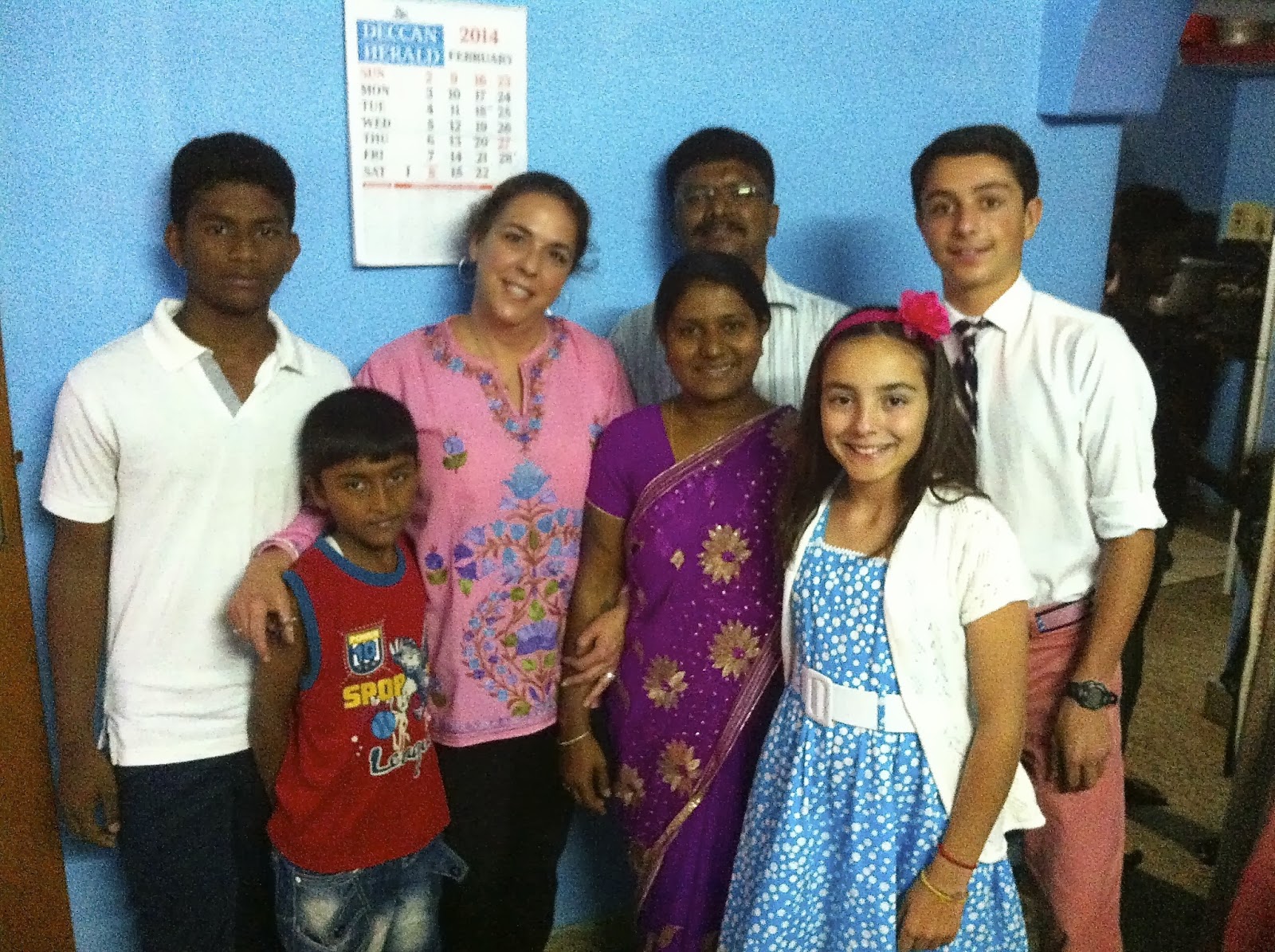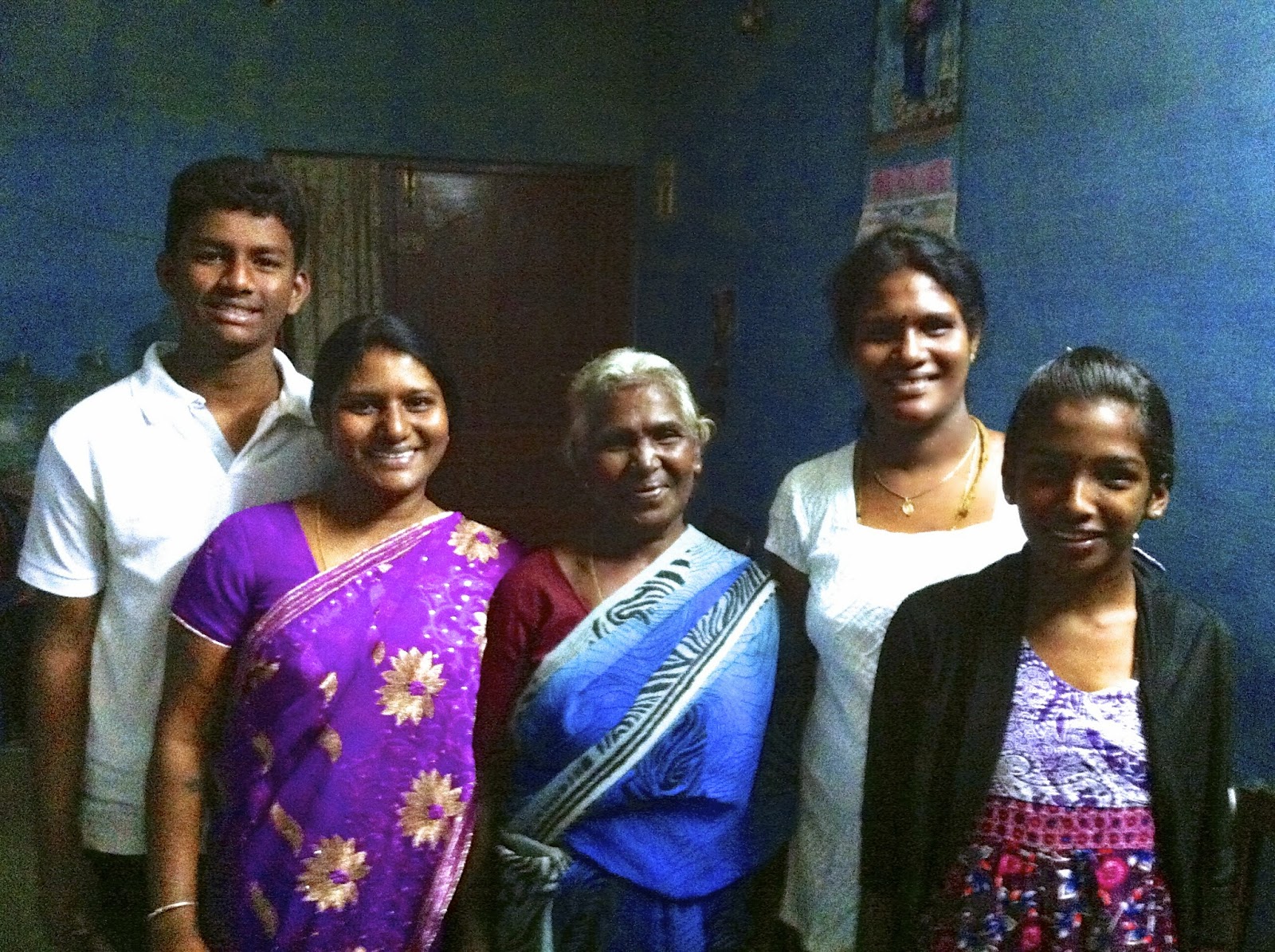We feel so lucky to have Nirmala in our lives – she works as our house
manager, cook and housekeeper. She has worked for Expat families for
over ten years and she speaks English, Tamil, Hindi, and the local dialect called Kannada - and she's a great cook. I have not cooked a meal, done
dishes, cleaned or washed clothes for two months! I have been thinking about how much
time I spend doing those things back home and wonder how I can possibly do things
differently, more efficiently (or get some help) when I return. I am much more
productive (and happier) when those chores are off my back. And I enjoy spending
time with Nirmala - she teaches our children about local culture and we are getting to know her family and life story.
Nirmala told me on Monday that she was getting married on Friday, which was Valentines Day. She has lived with her partner Mahesh for seven years and they decided to make it official with a church wedding (they are Catholic).
 |
| Sari shopping |
I asked Nirmala if she had a new dress for the wedding and she said “no, but I'm fine. I’ll wear one of my
outfits.” I asked her if she would like a new sari and
offered to take her shopping. Nirmala was thrilled because she said if I
gave her the money for a sari she would spend it on her family, but if we
bought her a sari she would wear it. So Claudia and I took her shopping and Nirmala tried on 10 different saris and she looked beautiful in
all of them. She wanted Claudia to choose the one she would wear for her
wedding – and Claudia was honored.
Before meeting Mahesh, Nirmala was married to an abusive man. They had two sons and when she was pregnant with their third son, he walked out on her. He had abused Nirmala for years and she finally got the courage and the money to get a divorce and change her life. She
never wanted to see him again so she moved in with her mother and cut him off. It’s especially difficult in a culture where women without husbands
are often treated with disdain. Nirmala said her friends and family were
very worried about her and some said it was better to be married – even to an
abusive man – than to be a divorced woman in India. But she left – and started over.
 |
| Nirmala and her cousin in her kitchen |
Nirmala said her life
was very difficult and many times she went hungry – but she did it and she even enrolled her boys in a private Catholic school. She values education more than anything and is very strict with her boys – she doesn’t allow them to leave the house after school – they have to stay in and do their
homework – and Nirmala doesn’t want them playing with other kids from the
neighborhood – she thinks they are a bad influence.
 |
| Nirmala and Mahesh and two sons...and our family |
We met Thomas, Kevin and her younger son at her “anniversary party” which was really her ‘wedding party’ – she called it
her 'Thanksgiving party.' We were honored to be invited to her home and
we brought a huge cake with two hearts that said Congratulations Nirmala and
Mahesh. Her house was in a crowded neighborhood on the second floor – just two
rooms – and all three boys sleep in the living room – the eldest and youngest share a
twin bed (which serves as the couch and TV lounging area during the day) and Kevin, her middle
son, sleeps on the floor. They have one small bedroom for Nirmala and Mahesh and a
very small kitchen and bathroom with no shower, just a bucket for
washing. There are a few Christian prayer plaques on the wall – they are part of a
Baptist evangelistic church, and some family photos. And I saw a few books and games, a very old TV and there is lots of love and laughter.
The party was wonderful – Nirmala invited her mother
and sisters and cousins and some friends and we were the only foreigners – she
said we were the guests of honor. There was not enough room for people to eat
in her apartment so she sent us downstairs with a few of her friends to eat in
her mother’s apartment – which was smaller than Nirmala’s.
 |
| Nirmala and her mother |
After
dinner Noah and Adam played the guitar and sang and her family and friends
loved it. The guests didn’t know the Beatles and Dylan songs, but they clapped along
and sang the chorus. It was a wonderful evening.
It’s hard to imagine how Nirmala and Mahesh will ever climb out of their hand to mouth situation. They both work for ex pat families – he is a full time driver for Goldman
Sachs – he probably makes 30,000 rupees a month ($491) and Nirmala makes 22,000
($271) we pay her double what the average cook is paid because we felt awful
paying less to someone who is doing so much work – and she asked for the bigger
salary because she is an experienced house manager – not just a
cook…still, I give her extra money at the end of the week and buy her things
like an oven. Nirmala didn’t have an OVEN. She is a great cook but told me that
she onl had a microwave and when she wanted to bake a cake or cookies she would bake it at what she calls, “my
ma’am’s house” and then bring it home on the bus.
 |
| Nirmala's family... |
 I took Nimala to the store and asked her to pick out an oven and we had our driver take Nirmala and the oven home to her apartment (she usually takes the bus). We plan to give her son Thomas Noah’s guitar when we
leave, and we will give her all of our household supplies and we plan to help with the kids’ school
tuition…that is the least that we can do. Nirmala brings joy and laughter, spirituality, calm
and great food into our home. We are blessed.
I took Nimala to the store and asked her to pick out an oven and we had our driver take Nirmala and the oven home to her apartment (she usually takes the bus). We plan to give her son Thomas Noah’s guitar when we
leave, and we will give her all of our household supplies and we plan to help with the kids’ school
tuition…that is the least that we can do. Nirmala brings joy and laughter, spirituality, calm
and great food into our home. We are blessed.











